In which things begin to get very heavy and complicated and symbolic. Also, kitties!
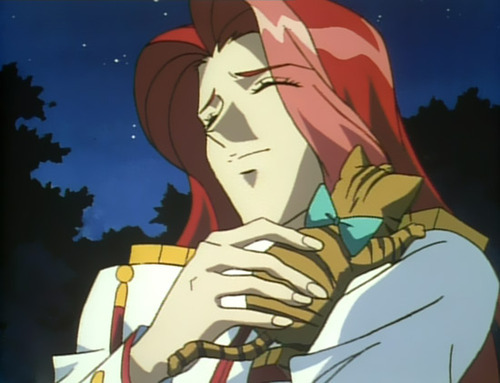
Click here for an explanation of the watch party, and an invitation to chime in with your own thoughts (Tumblr tag: #Utena Watch Party).
For Returning Viewers, Vrai’s episode analyses are here for your reading pleasure:
And my newbie-friendly ramblin’ is hanging out below the jump.
Notes from Next Door
This commentary assumes you’ve at least seen the episode(s) under discussion. It occasionally hints at future events or calls attention to recurring themes, but will be free of specific spoilers unless otherwise noted. As a reminder, please be courteous to newcomers in your comments and mark all spoilers as such.
Opening Chatter
I’m very glad we’re almost caught up with Vrai and will be able to do one episode at a time soon, because we’re getting to the point in the story where there are simply too many things we can (read: that I want to) talk about and just don’t have the time when covering multiple episodes at once.
Also, thanks to a combination of extensive critical watching/thinking coupled with an exceptionally busy week IRL (I don’t sleep anymore, I just guzzle coffee, work my day job, prep for a friend’s wedding, pack for a flight, and smash my fingers against a keyboard, occasionally forming coherent sentences), my brain is turning to mush. So if this one feels even more scattered than usual, I do apologize.
The Newly Engaged
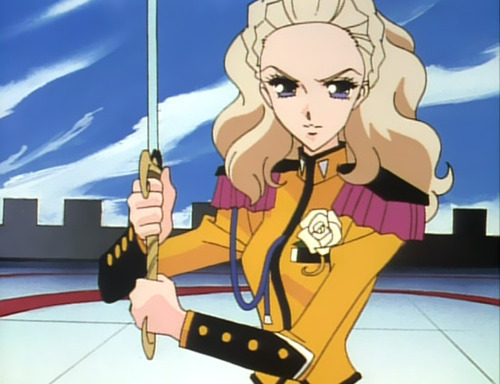
Since I’ve been kicking these off with personal reactions, let’s start with this: Nanami’s a much easier character to sympathize with as an adult. I pretty much hated her during this season the first time I watched this show, because we were the same age and she was That Brat, the spoiled kid who demanded attention and didn’t give two tosses about what other people wanted. Oh, and then she threw a kitten in a river, and I didn’t care that she regretted it immediately, it still solidified her position as The Worst.
But watching as an adult with some emotional distance between myself and middle school, I find it easier to sympathize with and even like her, because in many ways she’s the least complicated and most straightforward of the duelists—she doesn’t turn her tangible goals into abstract ones, hiding behind vague concepts like “shining things” or “eternity,” but faces her desires with an openness and honesty that’s actually rather refreshing.
Also (as Vrai noted in a paragraph I cannot seem to find no matter how hard I search), Nanami has no interest in either the castle or the Rose Bride, and as such is pretty much the only person who treats Anthy like her own person instead of using her as a “key” to unlock personal goals (be that proving miracles or finding eternity or becoming a prince who rescues princesses, ah-hem, Miss Utena). Nanami could care less about revolutions. She just loves her brother and wants him to love her back.
Of course, it’s not exactly that simple, largely because of the murky definition of that “love” she feels and seeks to have reciprocated. Despite the implications of incest, on this rewatch I’m now of the belief that Nanami is still a child with a child’s understanding of romance, and her “kiss me” to Touga doesn’t come from a place of genuine lust but rather from a place of confusion. On the one hand, she wants to keep living in a world where hugs and kisses don’t have any sexual connotations attached to them, but on the other, as Vrai notes:
Nanami senses on some level that childhood is coming to an end – or rather, that her brother is growing up, and that she might be in danger of being left alone. Hence her lavishly affectionate gestures toward him and exaggerated childish behavior (she talks about herself in the third person, something which is almost always a move for female characters to make themselves youthful/cutesy). (Nanami’s Precious Thing)
Her “kiss me” is a muddled wish and a failed compromise, an attempt to both (1) remain a child and (2) become the adult she thinks she “ought” to be so that her brother doesn’t leave her behind. She’s a confused kid whose confusion is only made worse by the fact that Touga appears to be a bit of a manipulative ass. When he slipped that rose signet on her finger, I suddenly felt sorrier for her than I ever have, because if she thought adolescence was messy before, hoo boy, you ain’t seen nothin’ yet, Miss Nanami.
Saionji and the “Masculine” Ideal
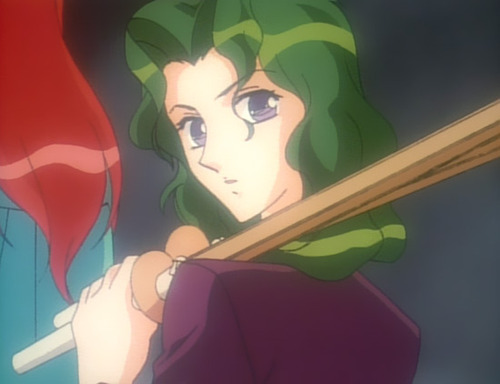
I’ll talk more about Saionji’s specific actions a little later, but before we get to that, I really just wanted to share some of Vrai’s commentary on his character for any newcomers, as I think it’s well worth considering, particularly in the context of how Utena handles traditional gender roles (both in fairy tales and modern culture):
[…M]uch of Saionji’s problem ties into the idea of the cultural myth of masculinity. He can’t simply love Anthy, he must WIN her. Every action he takes is bound up in the desire to control, dominate, or defeat – something Touga has mastered and that we see Miki being lured into during his duel. It’s a powerful narrative of entitlement, as well: the idea that power makes a man ‘deserving’ above all else, and that his power gives him full rights to push others into the requirements of his life.
Feed a boy that myth for long enough, prey on his insecurities often enough, and he will begin to do it to himself. He’ll hate himself for failing to live up to perceived expectations: whether in his lack of strength (he doesn’t seem to perceive that the other duelists have lost as well, and gotten on with their day to day lives) or his lack of sexual conquest (whether it be ‘losing’ Anthy or his complicated…relationship with Touga). And he’ll punish others who don’t fall into this trap that he’s set for himself, the one even he can’t measure up to (and that, perhaps, no one ever has). And, if he is as young and impulsive as Saionji, he will utterly lack the tools to see the trap that’s strangling him. (The Castle Said to Hold Eternity)
I mentioned during the sillier middle episodes that Saionji has been shifting out of a threatening role and into a more pathetic and occasionally even humorous one (as the butt of jokes, but still). We see him returning to the role of the aggressor in Episode 9, but now we have his aggression in context, particularly regarding his relationship with Touga and some of the factors that may have motivated him to become the (pretty awful) person he is today.
Again (and again and again and again), I want to stress that Utena never excuses his abusive behavior, and in fact pretty much always punishes it. But this is a show that believes every dragon began as an egg, and Saionji is no exception. He’s no more likable by the end of this week, but he is, if nothing else, becoming a person whose layers we can examine rather than a one-dimensional monster we’re simply meant to hate.
“There are rules in the forest”
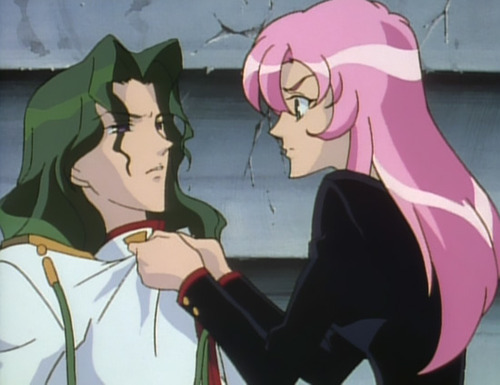
So the thing I keep coming back to with these two episodes (and the duelists involved) is how they form sort of a package deal, partly because they both revolve to some extent around Touga, and partly because they’re both quite separate from the two duels we saw previously. I mentioned last week yesterday (good God, whose crazy idea was it to marathon-blog this first cour?) that Jury understands the rules and knows how to function within them. The same can be said of Miki, who challenged Utena to a proper duel, lost, and then went about his life almost as if it had never happened. They’re both active members of the Student Council, model students who know the rules and live their lives within the borders.
Contrast them with Saionji and Nanami, two characters who share Utena’s ignorance of and disregard for the rules. Saionji attacks Utena in the arena even when there’s no official duel; Nanami keeps fighting even after the rose has been knocked from her chest. In these cases they know the rules and don’t care, because they’re too focused on their personal goals. Each one crosses the line in their fight against Utena, and each time Touga steps in to stop them—Touga, who seems so familiar with the rules that he can alter them at will.
Saionji and Nanami’s willingness to break the rules makes both characters more dangerous in the arena than Miki or Jury ever were (and perhaps more likely to “smash that egg” as well), but at the same time, it’s their ignorance of the rules that makes them weaker and easier to control. Saionji thinks he’s following the will of “End of the World” when he takes Anthy to the arena (despite Anthy’s protests), which ultimately leads to his expulsion; and Nanami’s innocence about what’s really going on with the Student Council means that, when she challenges Utena to a duel, she’s essentially entering the forest blindfolded, easily led by whoever takes her hand and shows her the way (even if that way leads right to a snake pit).
Touga uses their ignorance against them and ends up looking like a hero to everyone but the audience—even Utena, who’s more and more uncertain about the identity of her prince. Utena is more like Saionji and Nanami than any of them would like to admit: She’s willing to break the rules she does know, which gives her power, but there are far too many rules she doesn’t know, which makes it easy for others to use that power for their own ends. Of all the current duelists, only Touga has shown both a complete understanding of the game and a willingness to cheat at it, which makes him the most dangerous of the duelists and (IMO) a damn compelling figure. He seems to be setting up some pieces—but to what end, exactly? And just how does this all tie in with Utena and their shared past? It’s anyone’s guess at this point.
Chasing the “Prince”
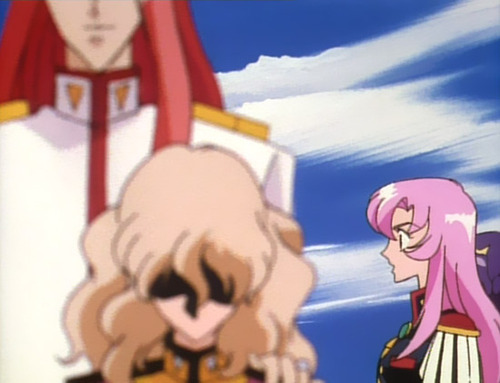
Another difference between our previous duels and the one’s from this week: Miki and Jury were chasing lost opportunities, relationships with family and lovers they wished they’d had (or maybe even did have, briefly) but have since lost. Conversely, this pair of episodes sees two people chasing something ahead of them. For Nanami it’s her brother, entering adulthood and moving further away from her. And for Saionji? His goals are maybe the most confused of the duelists, as they are rooted in the past, tangled in the present, but seemingly fixated on the future.
He tells Anthy he’s in love with her, that he wants to see “eternity” with her. (“Eternity”…now there’s a word as simultaneously tangled in the past, present, and future as Saionji himself.) But when they go to the arena and the castle appears to open, he abandons her without a second thought. Saionji actually has a chance here to rescue a girl trapped in a coffin and he ignores it in favor of the castle, leaving the actual rescuing to Utena, who for all her naivety is at least in that moment focused on a person instead of an abstraction—on saving Anthy rather than achieving any grand ideal. For all Saionji’s talk of love, Anthy is really just a key for him, a gateway to what he really wants.
And what does Saionji really want? Not “eternity,” I would argue; like Miki’s “shining thing” and Jury’s “miracles,” it’s a big, intangible idea that he paints across a very real and tangible situation. And, like Nanami, Saionji is “chasing Touga’s back,” sprinting to surpass him, to finally “beat him” at—well, everything, really. At kendo, at helping sad little girls in coffins (at being a “prince”?), and of course, at finding something “eternal.” He believes Touga showed the young Utena that “something,” and now Saionji wants it too. But he “wants” eternity about as much as he “loves” Anthy: they’re a means to an end, romantic—or perhaps “chivalrous”—concepts he can use to make his very normal adolescent goals seem as lofty as the arena in which he duels.
But why, exactly? That’s a topic Utena spends much of its next two cours exploring, for all of its characters.
The Sensei Next Door
Another semi-recurring segment, mostly to prove that I do, every so often, actually perform some research of my own.
Feminist and Feminisuto
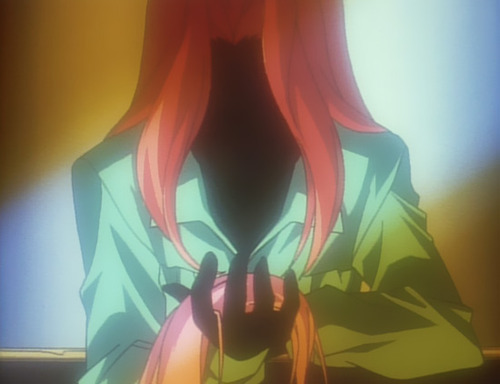
One of the fun little benefits to watching Utena now is that I do have at least a basic handle on the Japanese language and am able to pick up on words/phrases characters use and compare that to the translation. So imagine my confusion when listening to Touga explain that he is a friend to all women, I heard him use the word feminisuto, which sure sounded like the Japanese pronunciation for “feminist,” but which the subtitles translated to “chivalrous.”
Some searching around led me to a book called Unwrapping Japan: Society and Culture in Anthropological Perspective (Eyal Ben-Ari; 1992), which I now feel like I should own, but more to the point:
What seems to have happened to the word is that when the English word ‘feminist’ was absorbed into Japanese, it only retained part of its meaning, namely, the part indicating being nice to women and being worth receiving women’s praises. The part indicating being nice to women by treating them equally was ignored… When the word was introduced into Japanese to express male chauvinistic behaviour, there was no clash between the way the word was used and people’s knowledge of the word, given that the word did not exist. (pg. 82)
While a few more recent blog posts/forum entries I found from those living in Japan do mention that the word’s original English definition is also understood (at least in certain circles of society), which suggests the term’s meaning may be adjusting, circa 1996 (when Utena aired) the primary meaning for feminisuto likely was “chivalrous.”
I’m no expert on modern Japanese society (now the Heian Period, on the other hand…), so I don’t feel qualified to make any overarching statements about this. I’m just a linguistic geek who fell down a research rabbit hole and felt like sharing with you nice folks at home. But I can’t shake the feeling that both Ikuhara and Enokido Yoji (credited with the script here) were familiar with the original English meaning of the word, and choosing to have Touga use it at least twice (that I noted) when he’s describing himself to Utena sure doesn’t feel like an accident.
—————
Screenshots snagged from Empty Movement.

One thought on “Utena Watch Party: Episodes 9-10”